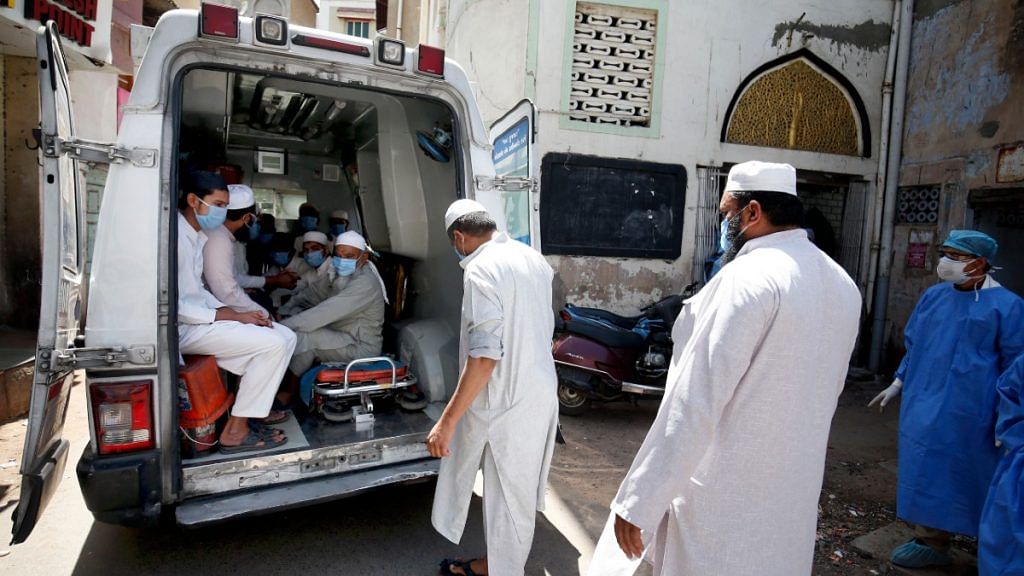New Delhi: When Farooq Basha, a 42-year-old Tablighi Jamaat member staying in Delhi’s Sultanpuri quarantine facility heard that donating his plasma could help save lives of coronavirus infected, he knew he was going to volunteer.
Basha, who was among the 2,500 who participated in the Jamaat’s Nizamuddin congregation last month, tested positive for Covid-19 on 30 March and was subsequently treated at Rajiv Gandhi Super Specialty Hospital.
After a week-long treatment, Basha tested negative first on 8 April and then again on 18 April.
“When Maulana Saad issued an appeal saying everyone who tested negative should donate their plasma, I knew this was a way to show my gratitude to God as well as to all the doctors who helped treat me,” Basha told ThePrint.
Maulana Saad, the cleric who led the Jamaat’s congregation and was later booked for culpable homicide, issued a letter last week appealing to all recovered Jamaat members to donate their plasma.
On Sunday, the same day Delhi CM Arvind Kejriwal made a similar appeal, Basha donated his plasma after ending his Ramzan fast for the day. “If I can be a medium to help others who are suffering, just like I was, nothing will make me happier. There can be no greater act of patriotism,” he said.
Also read: How Tablighi Jamaat was born from Mewat’s ‘drinking Muslims who couldn’t even read namaz’
Pledge for plasma
The plasma therapy involves the transfusion of plasma from a recovered coronavirus patient to a critical patient. The theory is that the blood of a recovered patient is rich in antibodies which can boost the body’s immunity response to the virus.
A total of 350 Tablighi Jamaat members who recovered from the coronavirus infection have taken a pledge to donate their plasma to help critical Covid-19 patients in Delhi hospitals.
Sources in the Delhi health department told the ThePrint that 60 of these 350 have donated their plasma, after they tested negative twice.
“There is a process as not every member who comes forward can donate plasma even if they wish to,” said a health department official requesting anonymity.
“At first, several Tablighi Jamaat members came forward expressing their willingness to donate plasma, post which we collected their samples to ensure the reports are negative. Only after that we spoke to them about donation of plasma,” added the official.
Of the 2,293 people who attended the Nizamuddin Markaz, 1,080 tested positive in Delhi and were put in quarantine. Those who have recovered are being urged to donate plasma.
Dr S.K. Sarin, director, Institute of Liver and Biliary Sciences (ILBS) and chief of the panel constituted to tackle Covid-19 in the national capital, has urged people to donate plasma as an act of “deshbhakti” (patriotism).
Also read: Delhi’s Nizamuddin — a bustling blend of history and spirituality, until Covid-19 struck
Who is a good donor?
In order to be a donor, one must be healthy, said Dr Sarin in a video briefing with Kejriwal. The potential donor must have a respiratory rate higher than 30, must have less than 90 per cent oxygen saturation, a haemoglobin count of at least 12 and no history of cardiovascular issues or diabetes.
“The process didn’t last longer than two hours. The doctors were extremely friendly and kind,” said Tabrez Khan, who donated his plasma at ILBS on 20 April.
A 36-year-old Delhi resident, Khan had contracted the coronavirus from his sister who returned from Saudi Arabia in March. Khan was an organiser of the Jahangirpuri protest against the Citizenship Amendment Act. He was treated at the Lok Nayak Jai Prakash Narayan Hospital (LNJP) hospital after testing positive, and was given a clean bill of health on 5 April.
“At this point, when so many of my fellow countrymen are suffering, I knew this had to be done,” he told ThePrint.
Also read: Plasma therapy on Delhi Covid-19 patients yields positive results, say Kejriwal & top doctor
Plasma has no religion
In a video press conference Sunday, Kejriwal said, “It is possible that a Muslim’s plasma can save life of a Hindu patient or the plasma of a Hindu may save the life of a Muslim person. God did not discriminate between humans. Why have we created a wall between us? Coronavirus affects all — be it Hindu or Muslim.”
His comments come weeks after the Delhi Minority Commission wrote to the government to discontinue categorising the Tablighi cases separately, calling it a “thoughtless classification”. Following this, the cases were categorised under “special ops”, and then eventually dropped on 18 April.
“We have been subjected to a lot of bad press, communalisation. We have been demonised. But with more Tablighis coming forward to donate their plasma, hopefully that will end,” said Anas Syed, another plasma donor.
Also read: ICMR allows clinical trials of plasma therapy. What this means for fight against Covid-19
